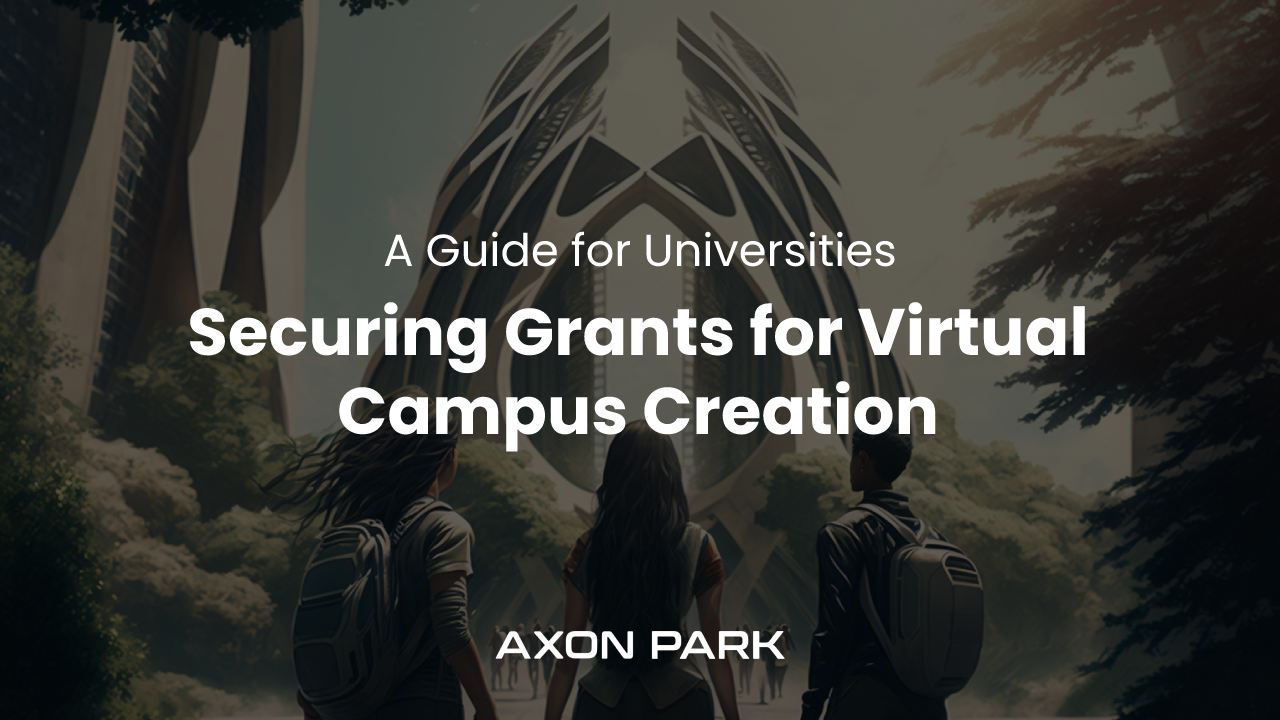The rapid rise of the metaverse has revolutionized not only the way people communicate, work, and socialize but has also significantly impacted the educational landscape. In recent years, universities have been exploring the potential of virtual campuses and interactive courses to enhance students’ learning experiences and bridge geographical barriers. However, the costs associated with developing and implementing these virtual environments can be daunting for many institutions. This is where grant opportunities come into play, enabling universities to acquire the necessary funding to bring their virtual campuses to life

At Axon Park, we have successfully supported several universities as they navigate the grant application process, securing funds for the development of their virtual campuses and interactive courses in the metaverse. In this article, we will outline key strategies for applying for grants, and share insights into how universities can leverage these opportunities to establish a strong presence in the world of virtual learning. If you work with a University and are interested in applying for a grant to develop a virtual campus, you can reach out to us here.
1. Identify the Right Grant Opportunities
The first step in securing grants for the development of virtual campuses is to identify the right funding opportunities. Several organizations in addition to your University, including government agencies, private foundations, and corporate entities, offer grants for educational innovation and technology integration.
To find suitable grants, universities should:
- Conduct research to identify relevant funding sources, both nationally and internationally.
- Leverage their networks, including alumni and other stakeholders, to gather information about potential grant opportunities.
- Consult with faculty members and staff who have experience in writing successful grant proposals.
- Regularly monitor the websites of funding organizations for updates on grant offerings and application deadlines.
2. Prepare a Compelling Grant Proposal
A well-crafted grant proposal is crucial in convincing funding organizations to invest in your virtual campus project. Some key elements of a successful proposal include:
- A clear and concise project description, outlining the objectives, implementation plan, and expected outcomes of the virtual campus.
- A detailed budget, providing a transparent and realistic breakdown of the project’s costs, including technology, staffing, marketing, and maintenance.
- A strong case for the project’s impact on student learning and engagement, supported by relevant research and data.
- Collaboration plans with industry partners, showcasing the project’s potential to drive innovation and have a high likelihood of success.
- A timeline that demonstrates the project’s feasibility and the university’s commitment to timely implementation.
3. Engage Stakeholders and Build a Support Network
To maximize the chances of success, universities should engage stakeholders and build a support network for their virtual campus project. This can involve:
- Collaborating with faculty members to ensure the project aligns with the university’s academic goals and curriculum requirements.
- Engaging students and gathering their input on the design and functionality of the virtual campus.
- Partnering with technology providers, such as Axon Park, to leverage their expertise in virtual reality and immersive learning environments.
- Seeking endorsements and letters of support from industry partners, alumni, and other stakeholders to strengthen the grant proposal.
4. Demonstrate the University’s Commitment to Virtual Learning
In addition to a strong grant proposal, universities must demonstrate their commitment to virtual learning and the metaverse. This can be done by:
- Showcasing previous successes in integrating technology and innovation into their educational offerings.
- Highlighting any existing virtual learning initiatives, such as online courses or remote learning programs.
- Presenting a clear vision and roadmap for the university’s future in the metaverse, including plans for ongoing support and maintenance of the virtual campus.
5. Learn from Axon Park’s Success
At Axon Park, we have worked closely with several universities to secure grants for the development of their virtual campuses and interactive courses. By sharing our expertise and collaborating with these institutions, we have enabled them to take their first steps into the world of virtual learning and establish their presence in the metaverse. Our successes serve as valuable examples for other universities looking to harness the power of grants for their own virtual campus projects.
For instance, we partnered with a prominent private university to develop a grant proposal that highlighted the institution’s commitment to immersive learning and its potential to revolutionize the student experience. By showcasing the university’s vision for the future and presenting a well-researched plan for the virtual campus, we were able to secure significant funding for the project. We have since built out a beautiful virtual campus with plans to onboard their entire student population of over 40,000 users.
In another example, we worked with a large public university to identify relevant grant opportunities and collaborated on a proposal that emphasized the institution’s unique strengths and innovative approach to teaching. This strategy helped the university obtain funding from both public and private sources, enabling them to establish a virtual campus and courses that are catered to the needs of their diverse student population and learning objectives.

Enter the virtual campus
Ready to take your first step?
At Axon Park, we are committed to helping institutions navigate this exciting new landscape and tap into the vast potential of the metaverse. With our expertise and track record of success in securing grants for virtual campus development, we are well-equipped to guide universities through the grant application process and provide the support needed to bring their virtual learning visions to life.
Reach out by clicking the button below and we’ll help you explore options to bring your virtual campus to life!



